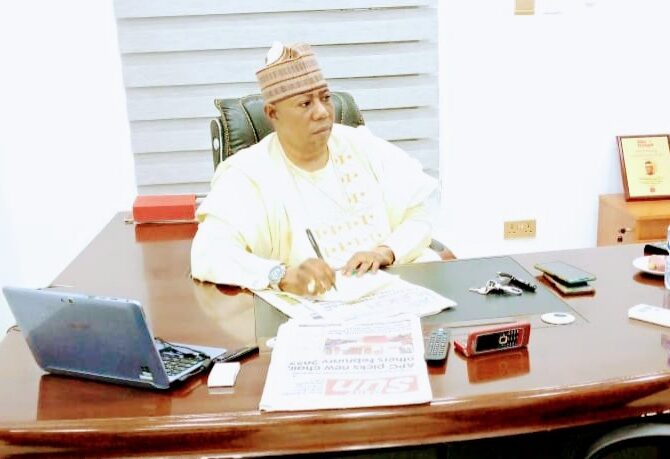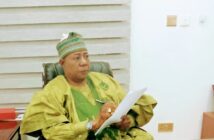That President Muhammadu Buhari has cemented his place on the positive side of posterity is no longer debatable. He has demonstrated patriotism and statesmanship, unlike many leaders who leave everything to chance when in their second term. In line with his avowed commitment to hand a robust economy to his predecessor, Buhari was once again in Brussels, Belgium, where he joined other world leaders for the 6th European Union-African Union Summit.
The Summit is focused deliberating on financing for sustainable and inclusive growth, climate change and energy transition, digital and transport (connectivity and infrastructure), peace, security and governance, and private sector support and economic integration. Others are education, culture and vocational training, migration and mobility; agriculture and sustainable development and health systems and vaccine production.
While President Buhari is striving hard to see that the economy prospers, his deputy, Vice Yemi Osinbajo, has remained a dependable ally. Osinbajo’s active support and participation has helped to wrought great economic miracles. One incontestable character of President Buhari’s political leadership is, first, the ability to delegate power to subordinates without the usual suspicion. Until the Buhari-Osibanjo era, what most Nigerians have known about president and vice president is cat and rat relationship. Some relationships at this level have even degenerated to open name calling, outright insults and confrontation.
However, the last seven years of President Buhari and Vice President Osibanjo have demonstrated, once and for all, what is possible, where a president is engrossed in selfless service to his nation, and his vice is loyal to his boss’ policies, principles and ideals.
John Adams, the first person in the United States to hold the position, called VP’s office “the most insignificant office that ever the invention of man contrived”. But in the past few years, Nigeria’s current vice president, Osinbajo, has defied the normal expectations by spearheading a number of projects aimed at making life a bit easier for people in a country where daily existence is hard.
It all started with the Presidential Enabling Business Environment Council (inaugurated by President Buhari in August 2016). Buhari entrusted the onerous task to his vice because he trusted his ability to do the right thing. True to Buhari’s expectation, the team led by Osinbajo implemented a 60 National Action Plan between February and April 2017, with almost 95 percent of the targets achieved.
The aim of Ease of Doing Business is to remove the bottlenecks that make it tough to establish and run a business in Nigeria. One of its key alleviations is that visitors can now apply online before boarding a flight, and then receive their visa on arrival in the country.
As a result of policy on EDB, Nigeria now ranks 131 on the World Bank’s Doing Business 2020 index. The nation moved up 15 places from its 2019 spot and has been tagged as one of the most improved economies in the world for running a business.
Others are MSME (Micro, Small and Medium Enterprises) Clinics, and the National Social Register. These projects were all conceptualised, incubated and implemented in the office of the vice president. The Government Enterprise and Empowerment Programme gives micro businesses access to credit, sometimes in amounts as low as 10,000 naira. Osinbajo’s diligence in the office may have something to do with his background. The 64-year-old is a professor and lawyer, with years of public-service experience as the attorney general of Lagos.
In response to the COVID-19 pandemic, Buhari asked Osinbajo to oversee an economic sustainability plan, which among other strategies was meant to protect livelihoods, pay monthly stipends to the urban poor, and salaries to staff in private education and transport businesses.
On Monday, 17 January 2022, at the presidential villa, Osinbajo inaugurated an expanded partnership committee on sustainable Blue Economy, a step he said was part of the administration’s move to further explore the economic opportunities available through oceanic and marine resources around the country.
A look at the composition of Osinbajo’s committee and the ministries and agencies represented, it is obvious that the country is looking to assess its current realities, opportunities and challenges, and going on to review policies around the subject, in order to strengthen the relevant institutions for the development and prosperity of a blue economy.
Nigeria is clearly set to delve into proper coastal management, which would lead to the sustenance of the surroundings and improvement of the well-being of the people, as well as avail vast opportunities for economic growth by enhancing power generation, security, oil and gas production, transportation, fisheries, tourism and several other international trade and investment.
The vice president once declared that he will remain loyal to his principal, President Buhari. Osinbajo described the president as the “best boss” and assured Nigerians that Buhari is fully committed to his campaign promises. And on his part, while commending his deputy on his 63rd birthday, President Buhari noted that Osinbajo’s intellectual capacity has impacted positively on the overall accomplishments of the federal government, most notably, in the economic and social intervention programmes.
With the kind of loyalty and competence demonstrated by Prof Yemi Osinbajo in the last seven years, nothing is out of place if President Muhammadu Buhari decides to throw his weight behind his vice, to ensure the consolidation of his legacies.
-Ibrahim is director, Communications and Strategic Planning, of the Presidential Support Committee (PSC).



